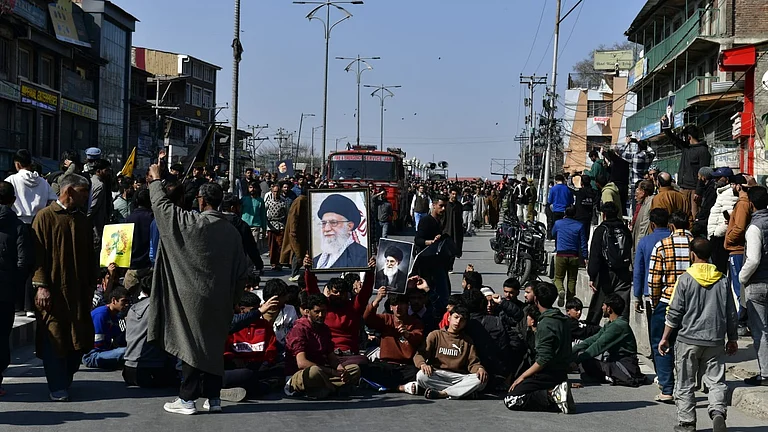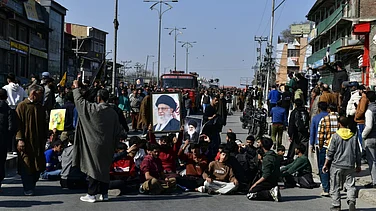Until the night of April 6, Rakesh, in his mid 30s, working as a ‘delivery partner’ with Blinkit didn’t know what was coming in his way. Around 10 pm they received a message that their rate chart would be updated from the next day and they would receive Rs. 15 per delivery instead of Rs. 25.
“We didn’t immediately register any protest. Next day, we went to work and found our income was slashed almost by Rs. 500,” says Rakesh who has been working with Blinkit for more than a year. Next day, in the Kalyan Vihar store they told the manager that they wouldn’t work if not paid accordingly. “It was impossible for us to continue. Earlier we used to earn around Rs. 1700 a day for 37 deliveries. It was reduced to Rs. 1000-1200. If you consider the petrol cost of Rs. 250-300 a day, our daily earning stands merely at Rs. 700,” he adds.
The decision to protest against the slashed delivery charge which was earlier Rs. 50 when Blinkit was known as Groffers, immediately spread across different dark stores leading to shut down and closing of operations. “At least 70% of the protesting workers were retrenched and their accounts had been blocked,” says advocate Ritwik Raj, who is currently the convenor of App Karmachari Ekta Union that works for uniting the gig workers across the platforms. The employees received a notification in their app that reads, “Account terminated due to strike enabler.”
“Instead of listening to the demands of their employees they called bouncers and Police to threaten them,” Ritiwik adds. In one of the dark stores in Nathu market near Square Mall, Delhi, the employees were allegedly asked to sign a paper declaring that they would not protest. As per the latest estimate Blinkit has around 371 stores across the country.
The protests went on for around 10-12 days but couldn’t manage to gain much as most of them had to go back to work at the reduced rate due to lack of employment opportunity. “What would people do? You have to understand who actually join this profession. Mostly they are the people who are not that much educated to do other jobs. And this job doesn’t need any skill. What they need is to take inhuman workload to survive,” says Sunil Saxena who had joined Blinkit when it was known as Groffers.
Though their operation was affected severely, the Blinkit management denied most of it. In a statement issued during the protest, Blinkit, which is now owned by Zomato, said, “We have introduced a new pay-out structure for our partners that compensates them based on their effort to deliver an order. This is an opt-in exercise, and our teams are on the ground to answer any questions from the partners. We believe this is a positive step for our partner ecosystem, as it is fair to them and our customers. Although some locations have experienced disruptions, we are actively engaging with our partners to get the stores back up and running for our customers.”
ICICI security in its research reported around 1% revenue loss of Zomato from its grocery service Blinkit during this period. It also pointed out 0.15% loss of consolidated revenue of Zomato in the first quarter (Q1) of financial year 2024.
However, apart from suspension of operations in a few stores for a while, did it actually have any effect on the platform-based economy that has been accused of exploiting their workers with impunity? Ritwik finds a positive side of the movement. “It was for the first time the workers from one store got connected to the other. They had put their claims in an organised manner and that is a positive beginning,” he notes.
Rallying against the fallacy of 'partnership'
The major change, nevertheless, came in the narration through the movement. While the absence of social security schemes like ESI, EPF, bonus have always been points of contention, the leaders of the movement this time found the root cause of their unfortunate condition – the politics of nomenclature. “Why are they called partners? It is just a cloak to deny them the workers’ rights,” says Ritwik.
Though they had earlier social security benefits like EPF and bonus when the organisation was known as Groffers, Blinkit allegedly stopped all such facilities. “I used to get Rs. 18000 as salary in the early days. Then they changed the policy and called us partners. We started running after incentives,” says Sunil. Shaik Salauddin, National general secretary of Indian Federation of App-based Transport Workers (IFAT), an organisation that has been trying to unionise the gig workers across the country deciphered the fallacy of such partnership.
“Where have you seen that the partners are being threatened by bouncers and Police just for claiming their rights?” asks Salauddin. The workers invest in bike and petrol and also give their hard labour to push the company to the heights but in return are being treated in inhuman manner, he adds. K Hemalata, the president of Centre of Indian Trade Unions (CITU) also questions the connotation of ‘partners’ and says that firstly they should get the recognition of ‘workers’.
“Every month at least 6-7% gig workers are retrenched by these platforms. There is neither any social security, nor any job assurance. If you go to labour court, the first thing the court will question is the pattern of your employment. The labour law cannot be implemented for the ‘partners’,” Ritwik says while pointing to the complexities of such connotation.
App Karmachari Ekta Union in its submission to the Union labour minister Bhupendra Yadav on April 27 also noted the necessity of recognising them as ‘workers’. The letter notes, “The state and central government should bring necessary laws to recognise these workers as ‘workmen’.” The submission also asks for guaranteed salary of Rs. 26,000 a month besides the assurance of 8 hours’ work, EPF, ESI and other social security benefits. The labour ministry, however, hasn’t yet responded to their demands.
The ongoing struggle of gig workers
The protests of the gig workers, nonetheless, are not new. In 2021, women workers of Urban company protested against the policy change and were punished through retrenchment. The fate of Swiggy or Zomato workers is not different as well. Before the pandemic, they used to be paid Rs. 35 per delivery and post-lockdown, it was reduced to Rs. 15-20.
In 2020, Telangana Gig and Platform Workers Union (TGPWU) organised 26 days’ protest. “We got the attention of labour ministry and they sent notice to the companies. However, nothing much changed,” says Salauddin, the founder president of TGPWU. Primarily, the platforms though accepted their requests to keep them within their zones and not push them to travel beyond a certain distance, with time most of it went astray.
The Indian Federation of App-based transport workers (IFAT) in 2021 filed a writ petition to the Supreme Court asking for its intervention to provide the ‘rights to social security’ to these gig workers. Salauddin notes that even after 3 consecutive notices, the platforms haven’t yet responded. In 2020, the parliament passed a Code on Social Security and proposed to offer social security and employment benefits to the platform workers. But it also remained in abeyance due to lack of concrete mandate to follow it.
Myth of Incentives: A Dikhawa?
The narrative of shifting from a salary-based structure to incentive-based earning is a fallacy for most of the platform workers. When the system was introduced, it was going pretty well. Apart from Rs. 50 per order, they used to get additional Rs. 150 for completing 18 orders, Rs. 400 for 25 orders and Rs. 500 for 37 orders respectively. Now, all of these benefits have been taken away, says Rakesh.
Have they stopped the incentives altogether? “They now declare incentives on different occasions like Diwali and others when they fear that there would be less riders. Now, on these holidays, the riders gather in the store in numbers but the total amount of delivery doesn’t go up and it gets distributed among many. This doesn’t add any extra value to our income,” he adds.
Blinkit has however introduced a distance-based incentive policy. “If you go to travel more than 5 km, you will get Rs. 10 pr km,” says Siddharth, who is from Uttar Pradesh and joined Blinkit last year only. “But these are all dikhawa (eyewash) as hardly we get such orders. Since morning I have been working for 6 hours and my earning now stands at Rs. 214. I haven’t got a single order beyond 2 kms,” he adds.
The distance shown in the app most of the times is allegedly less than the original distance travelled. “It will show 3 km in app whereas the real distance would be 5 km and you will not get the incentive,” says Rakesh. Due to the algorithm, they hardly get to cross the numbers required to achieve those incentives as well, says Ritwik. “If 18 orders are the benchmark, it is very difficult for the workers to get the 19th order,” the convenor of App Karmachari Ekta Union notes.
“How many people do get the incentives? Not more than 5 among 100,” says Salauddin. In this backdrop creating union is the only way for the gig workers to claim their stakes. CITU last year though had a convention of their gig workers’ wing All India Gig Workers’ Union, it is still in a nascent stage. Hemlata, CITU president points out, “They should be recognised as worker and then only the minimum wages and other social security benefits could be ensured.”
Covid-induced financial stress and precarious lives
But who are these gig workers? Are they the students working part-time to get some additional income, as the Blinkit puts it in their social media post, or those who come from the marginalised section and striving to get livelihood through these jobs? All of the workers Outlook spoke to belong to very poor economic background and most of them joined as gig-worker after facing huge loss during Covid-induced lockdown.
Rakesh had his own business of processing mustard oil. “I had suffered a huge loss during the covid lockdown. There is bank loan and instalments on me. I had to join this work. There was no other option.”
Siddharth wanted to run his own business and came to Delhi before lockdown from Etah, Uttar Pradesh. He started his own stall of Samosa and Jalebi but couldn’t continue as he financial distress of lockdown had badly hit him. He closed it and joined as a delivery worker of Blinkit. The same story echoes for Sunil who was a fruit seller before the lockdown.
It should be noted that the studies say around 135 million Indians lost their jobs and sources of income during Covid. And every year, Indian workforce is also getting 4 million new faces pushing most of them toward gig economy. However, Flourish Ventures survey in 2020 also noted that 90% of gig workers lost their income during the pandemic giving a leeway to the platforms to change the terms of contract and employment.
In this backdrop, is there any way out for the gig workers? Scholars mostly think that giving them the recognition of workers will primarily legitimise their position and they would be able to bargain with their employers through the formation of union. The basic success of the movement however can be found in the messages consumers get in the app. While Blinkit started its business with the promise that they would deliver in 7-10 minutes pushing the delivery workers towards rash driving, the movement has perhaps changed the narrative.
One of the regular customers of Blinkit shares a screenshot with Outlook that reads- “No Time Pressure: To ensure that delivery partners do not feel pressurised about time, we neither convey the ETA nor penalise them for delay.” For the gig workers, it is a primary victory indeed. However, another additional message pops up that busts the myth of distance-based incentive- it reads- “Reasonable Delivery Timelines: We are able to deliver so quickly because our delivery partners usually have to travel only 2 km from a store to your location.” While talking to Outlook, Siddharth gets another order, nevertheless, within 2 kms only.























